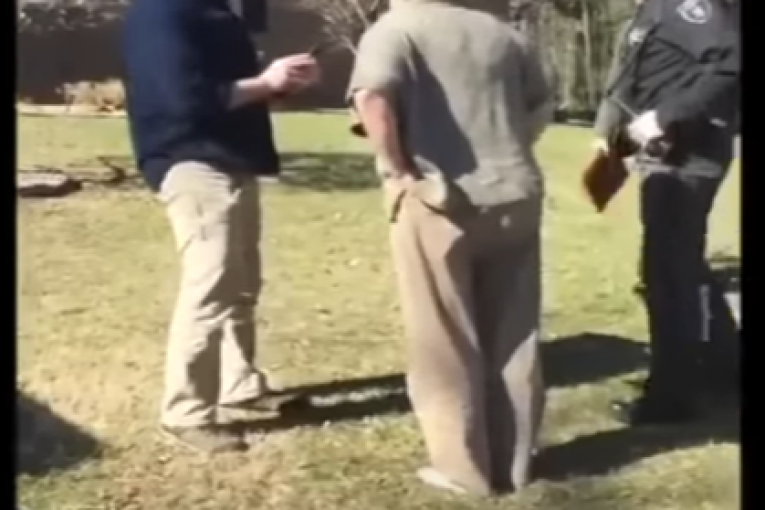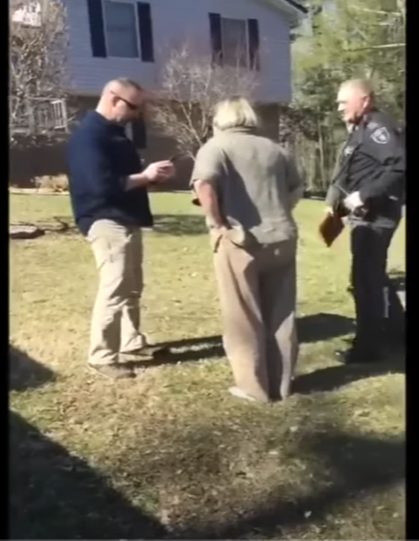

By Fred Johnson and Susan Bassi
Family Court Judge Louise Goldston presided over a family court hearing on March 4, 2020. The proceedings concluded after Goldston asked the husband in the case, Matthew Gibson, for his address and ordered him to return home within 10 minutes, telling him to “be ready.”
Within the hour, Judge Goldston, without her judicial robe, or gavel, appeared at Gibson’s home with her bailiff, Gibson’s ex-wife, and her attorney. A video taken outside the home shows Judge Goldston declaring she was going into Gibson’s home to enforce the “equitable” division of community property.
In his own driveway, Gibson attempted an oral motion, demanding Judge Goldston’s recusal. She declined and marched on to the house, threatening the ex-husband with arrest if he tried to stop her.
Standing on Gibson’s property in her street clothes, Judge Goldston ordered her bailiff to ensure the husband turned off his phone and threatened him with arrest a second time if he tried to document the incident. Without a warrant, Judge Goldston proceeded to the house, assuming an authoritative stance similar to that of law enforcement.
Inside the home, Judge Goldston directed the warrantless search. Her bailiff turning off his body camera about 7 minutes into what arguably was a home invasion conducted by a family court judge.
In the body cam footage that was captured, Gibson’s ex-wife can be seen taking photos off walls, gathering up videos, and collecting recipes she told the judge were hers. No formal records or inventory records were documented to show what was taken from Gibson’s home. The event unfolded in a manner beyond the bounds of a typical legal procedure, even for family court.
The incident, partially documented in a video recorded by the husband and a bystander, caught the attention of civil rights attorney John Bryan from West Virginia.

Bryan initiated a federal lawsuit against the judge for violating the husband’s civil rights. For years Bryan has educated the public about the case through his popular YouTube channel as the legal proceedings unfolded. A recent video about the lawsuit and the initial incident can be seen here.
Subsequently, civil rights attorney Patrick Jaiocomo from the Institute for Justice joined Bryan in arguing the federal case.
After thirty years on the bench, Goldston announced her retirement on January 30, 2023, as the federal case continued to advance. During this time, Goldston was reportedly censured and fined by the West Virgina Court of Appeals in November 2021 as threats of impeachment lingered.
Family court judges Deanna Rock and Glen Stotler are reportedly under investigation for lying under oath to protect Goldston.
On October 30, 2023, the 4th US Circuit Court of Appeal unanimously ruled in favor of Gibson, rejecting Judge Goldston’s immunity. Typically, police officers have qualified immunity concerning misconduct. Similarly, judges, including private judges, are granted court-established judicial or absolute immunity.
In tandem with qualified immunity, judicial immunity is one of the court-established doctrines intended to shield government workers from constitutional liability. Unlike qualified immunity, judicial immunity is absolute.
However, judges cannot act beyond their judicial capacity, such as conducting home searches with their bailiffs akin to law enforcement actions; if they do, they cannot claim judicial immunity.
The Davis Vanguard is committed to expanding coverage of California’s family courts and related federal lawsuits. Please subscribe, share and donate to support this reporting. If you would like to have a case or issue considered for our investigative reporting team, please email a brief summary for consideration. Due to limited time and resources, our staff may not be able to return all inquiries.

https://www.ca4.uscourts.gov/opinions/221757.P.pdf
CA4: No absolute immunity for a judge involved in search of ex’s property over their divorce
Posted on October 31, 2023 by Hall
“We consider in this appeal whether a judge who participates in the search of a litigant’s home is entitled to judicial immunity for actions related to the search. Judge Louise Goldston went to Matthew Gibson’s residence to look for items he had failed to turn over to his ex-wife after their divorce. She entered his home over his objections after threatening him with arrest should he try to stop her. She then supervised the seizure of designated items in the house. The only question before us is whether judicial immunity shields these acts. We hold it does not. Judicial immunity protects only judicial acts. It does not shield the conduct of judges who step outside their judicial role, as Judge Goldston did when searching Gibson’s home.” The judge was also barefoot during part of the search. Gibson v. Goldston, 2023 U.S. App. LEXIS 28744 (4th Cir. Oct. 30, 2023).